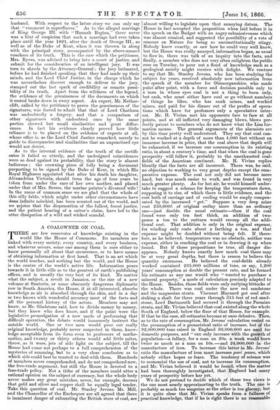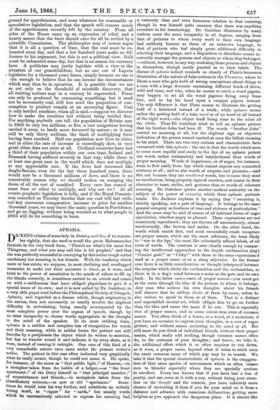A COALOWNER ON COAL.
THERE are few reservoirs of knowledge existing in the world like the House of Commons. Its members are linked with every society, every country, and every business, and whatever occurs, some one among them is sure either to know personally all about that occurrence, or to have means of obtaining information at first hand. That is an art which the world teaches, and nothing but the world, and the House is the centre of the world's active life. Information pours towards it in little rills as to the greatest of earth's publishing offices, and is usually the very best of its kind. No matter what the subject, a revolt in Jamaica, or the rise of a new volcano at Santorin, or some obscurely dangerous diplomatic row in South America, the House, if at all interested, absorbs knowledge as air is absorbed through the skin, and in a day or two knows with wonderful accuracy most of the facts and all the personal history of the actors. Members may not know, as Mr. Gladstone said, how to divide money by money, but they know who does know, and if the point were the legislative promulgation of a new mode of performing that difficult operation, the debate would immensely instruct the outside world. One or two men would pour out really original knowledge, probably never suspected in them, know- ledge acceptable from its form even to professors of mathe- matics, and twenty or thirty others would add little mites, throw, as it were, jets of side light on the subject, till the House had come not perhaps to a full comprehension of the mysteries of summing, but to a very clear conclusion as to which side could best be trusted to deal with them. Hundreds of members never comprehended, and do not comprehend now, the free-trade argument, but still the House is devoted to a free-trade policy. Not a tithe of the members could utter a rational opinion on the subject of currency, but the whole body never makes any great mistakes, never, for example, decrees that gold and silver and copper shall be equally legal tender. Take this question of coal. Mr. Stanley Jevons, Mr. Mill, and the Chancellor of the Exchequer are all agreed that there 18 imminent danger of exhausting the British store of coal, are almost willing to legislate upon that annoying datum. The House in fact accepted the proposition when laid before it in the speech on the Budget with an angry submissiveness which was almost comical, and suggested the possibility of a vote of censure on Nature for being so unconstitutionally stingy. Nobody knew exactly, or saw how he could very well know, but the House was really annoyed, information began, as usual to flow in, there was talk of an inquiry into the facts, and finally, a member who does not very often enlighten the public rose on Tuesday, to pour out a flood of knowledge such as a geological society might receive with delight. We venture to say that Mr. Stanley Jevons, who has been studying the subject for years, received absolutely new information from• the speech of the member for Glamorganshire, who made point after point, with a force and decision possible only to a man in whose eyes coal is not a thing to burn only, but cash, who must either have coal or go without numbers of things he likes, who has sunk mines, and worked mines, and paid for his dinner out of the profits of opera- tions which have for professors only a speculative inter- est. Mr. H. Vivian met his opponents face to face at all points, and at all inflicted very damaging blows, blows per- fectly patent to members who do not know what the Lies for- mation means. The general arguments of the alarmists are by this time pretty well understood. They say that coal can- not be worked at a depth of more than 4,000 feet without an immense increase in price, that the coal above that depth will be exhausted, if we increase our consumption in its existing ratio, in about a century's time, and that when the coal is gone prosperity will follow it, probably to the tmexhausted coal- fields of the American continent. Mr. H. Vivian replies bluntly that the facts are all incorrect. There was, he said, no objection to working to very great depths except the com- parative expense. The coal not only did not become more hard, but was much easier to work, and was found in very much greater plenty. As for hot air, he would himself under- take to suggest a scheme for keeping the temperature down, supposing it to rise, of which there is little evidence, and the cost both of carriage and of cooling would be amply compen- sated by the increased "get." Suppose a very deep mine cost 250,000/. of original outlay more than an ordinary one—just double. the usual estimate—then if the coal found were only ten feet thick, an addition of two- pence a ton to the outturn would recoup all the addi- tional cost. That addition is only in the original expense, for winding only costs about a farthing a ton, and that expense might be doubled without being felt. If, there- fore, as he believed, temperature was no obstacle, neither was expense, either in reaching the coal or in drawing it up when found. But if those propositions be true, all danger dis- appears. Nobody knows exactly how much coal there may be at very great depths, but there is reason to believe the quantity enormous. He believed the coal-fields already worked contained 235,000 millions of tons, or say, 1,200 years' consumption at double the present rate, and he formed his estimate as any one would who "wanted to purchase a mineral property," a mode of calculation precisely adapted to the House. Besides, those fields were only outlying bittocks of the whole. There was coal under the new red sandstone and the magnesian strata. Viscount Maynard got coal after sinking a shaft for three years through 315 feet of red sand- stone, Lord Dartmouth had secured it through the Permian strata, and Mr. Vivian believed that coal existed along the whole South of England, below the floor of that House, for example. If that be the case, all estimates become at once delusive. Then, as to the rate of consumption, Mr. Jevons' calculation rested on the presumption of a geometrical ratio of increase, but of the 92,000,000 tons raised in England 30,000,000 are used for domestic purposes, and "can only increase with the growth of population—a fallacy, for a man on 20s. a week would burn twice as much as a man on 10s.—and 24,000,000 in the manufacture of iron. To increase this latter in Mr. Jevons' ratio the manufacture of iron must increase pan i passu, which nobody either hopes or fears. The tendency of science was to economize the use of coal, not to increase its consumption, and Mr. Vivian believed it would be found, when the matter had been thoroughly investigated, that England had many years of prosperity before her yet.
We do not pretend to decide which of these two views is the one most nearly approximating to the truth. The one is probably as much too sanguine as the other is too gloomy, but it is quite clear that Mr. Vivian speaks from a fullness of practical knowledge, that if he is right there is no reasonable
ground for apprehension, and none whatever for reasonable or speculative legislation, and that the speech will remove much of the apprehension recently felt by the country. From all sides of the House came up an expression of relief, and a hearty assent that the facts should once for all be settled by a scientific Commission. The philosopher may of course argue that it is all a question of time, that the coal must be ex- hausted some day, and that a few hundred years make no dif- ference to his argument, but this is not a political view. Gold must be exhausted some day, but that is no reason for currency laws. A politician may justly legislate with a view to the situation of our grandchildren, but no one out of Laputa Q. legislates for a thousand years hence, simply because no one is yarn enough to believe that he can foresee the circumstances which may then be in operation. It is possible that we are as yet only on the threshold of scientific discovery, that all existing notions may in a century be superseded. Force can only be produced by consuming something, but it need not be necessarily coal, still less need the proportion of con- sumption to product remain at an unvarying figure. Coal is only bottled sunshine, when all is said,—suppose we discover how to make the sunshine toil without being bottled first. For anything anybody can tell, the population of Britain may in 2866 be only ten millions, or five, a vast emigration having carried it away to lands more favoured by nature ; or it may still be only thirty millions, the limit of multiplying force having been reached. Half our population now lives in cities, and in cities the rate of increase is exceedingly slow, in very great cities does not exist at all. Civilized countries have lost a third of their population within our own time, Ireland and Denmark having suffered severely in that way, while there is at least one great race in the world which does not multiply at any appreciable rate. If the Jews had increased like Anglo-Saxons, even for the last three hundred years, there would now be a thousand millions of Jews, and there is no conceivable reason why we should reckon on escaping the doom of all the rest of mankind. Every race has ceased at some time or other to multiply, and why not we ? At all events prophetic legislation is folly, and if the Royal Commis- sion conceded on Tuesday decides that our coal will last with- outiinl enormous comparative increase in price for another thousand years, we may leave the main question to Providence, and go on digging, without being worried as to what people in 2866 will-do for something to burn.































 Previous page
Previous page